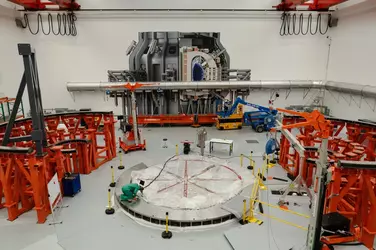By Ella Nilsen, CNN
Mon June 30, 2025

A person works on the cryostat base of the fusion reactor inside the tokamak hall at Commonwealth Fusion Systems in Devens, Massachusetts, on April 10. A full-sized image of the tokamak is superimposed onto the wall.
Tech giant Google is investing money into a futuristic nuclear fusion plant that hasn’t been built yet but someday will replicate the energy of the stars. It’s a sign of how hungry big tech companies are for a virtually unlimited source of clean power that is still years away.
Google and Massachusetts-based Commonwealth Fusion Systems announced a deal Monday in which the tech company bought 200 megawatts of power from Commonwealth’s first commercial fusion plant, the same amount of energy that could power roughly 200,000 average American homes.
Commonwealth aims to build the plant in Virginia by the early 2030s. When it starts generating usable fusion energy is still TBD, though the company believes they can do it in the same timeframe.
Google is also investing a second round of money into Commonwealth to spur development of its demonstration tokamak — a donut-shaped machine that uses massive magnets and molten plasma to force two atoms to merge, thereby creating the energy of the sun.
Google and Commonwealth did not disclose how much money is being invested, but both touted the announcement as a major step toward fusion commercialization.
“We’re using this purchasing power that we have to send a demand signal to the market for fusion energy and hopefully move (the) technology forward,” said Michael Terrell, senior director of energy and climate at Google.
Commonwealth is currently building its demonstration plant in Massachusetts, known as SPARC. It’s the tokamak the company says could forever change where the world gets its power from, generating 10 million times more energy than coal or natural gas while producing no planet-warming pollution. Fuel for fusion is abundant, derived from a form of hydrogen found in seawater and tritium extracted from lithium. And unlike nuclear fission, there is no radioactive waste involved.

Commonwealth Fusion Systems in Devens, Mass. on April 10, 2025.
The big challenge is that no one has yet built a machine powerful and precise enough to get more energy out of the reaction than they put into it.
Still, fusion is especially appealing to big tech companies like Google because it delivers a steady supply of baseload electricity for power-hungry data centers and AI. Google has also invested in geothermal energy and small nuclear reactor projects, which can also provide baseload power with no carbon emissions.
Commonwealth CEO Bob Mumgaard called the agreement the “largest offtake agreement for fusion” and said Google’s funding investment would allow his company to take necessary research and development steps to work towards developing its commercial fusion plant in Virginia at the same time it finishes its demonstration plant in Massachusetts and starts working towards ignition there.
“It’s hard to say exactly how much it accelerates it, but it definitely puts it in a category where now we can start to work more and more on ARC (the future Virginia plant) while we finish SPARC, instead of doing them very sequentially,” Mumgaard said.
